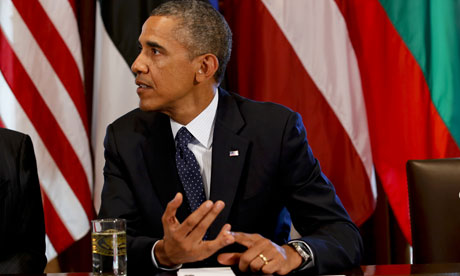If President Obama says Syria has used chemical weapons, most American liberals are likely to trust him

If Barack Obama says Syria has used chemical weapons, most American liberals are likely to trust him. Above, the president answers press questions about Syria at the White House on 30 August 2013. Photograph: Aude Guerrucci-Pool/Getty Images
As President Obama announces he will seek congressional authorisation for military intervention in Syria, the American left finds itself conflicted. According to the Pew Research Centre, 56% of Republicans support military action compared with 46% ofDemocrats; 24% of Republicans and 34% of Democrats are opposed.
While these are not majorities in opposition to intervention, they are sizable portions of the American public, especially among Democrats. So why has the anti-war left, which organised demonstrations with hundreds of thousands of participants in the runup to the Iraq war, been invisible on Syria?
There are three reasons. First, the anti-war movement has withered over the past six years, as Democrats rose to power and withdrew the US from Iraq.
Second, it is harder to organise the left against a Democratic president. Partisans on both sides are understandably less outraged by aggressive use of executive authority in national security when their own party is in power, since they assume a president from their party is more honest and competent. If President Obama says Syria has used chemical weapons, most liberals are unlikely to fear it is a repeat of George W Bush's false claims that Iraq possessed weapons of mass destruction.
Third, a limited bombing campaign against Syria would claim few, if any, American lives. Nato's recent intervention in Libya successfully prevented atrocities against civilians at an estimated cost to the US of only $1.1bn.
The politics of military interventions often create unusual political alignments. Elites, centrists, newspaper editorials and the top foreign policy advisers in both parties tend toward hawkishness, while each party has a non-interventionist wing on its perimeter. Among Republicans these tend to be small government absolutists. Among Democrats it is the leftwing, including members of the House progressive caucus. More than 100 House members, from both parties, had signed letters to Obama stating that he must receive congressional approval before taking military action. Establishment Democrats are generally sympathetic to circumscribed humanitarian interventions, such as the Nato bombing campaign in Kosovo during the Clinton administration. If the cost is manageable and the cause is moral, they see the intervention as warranted. That's why, for example, Tom Perriello, a former congressman who opposed the Iraq war and now runs the Centre for American Progress action fund, is in favour of a "surgical" strike against Assad.
But one of Perriello's colleagues, Matt Duss, a CAP foreign policy analyst, argues that the costs of intervention outweigh the benefits. Writing in the American Prospect, Duss worries that US intervention could strengthen the Assad regime's internal political appeal, provoke a Syrian retaliation against Israel, and empower hardliners and marginalise moderates in Syria's ally Iran.
Most of all, liberal intellectuals fret about the rule of law, both domestically and internationally. Some left-leaning domestic law experts, such as Scott Lemieux, had argued that for Obama to take military action without congressional approval would be illegal. Liberal foreign policy experts, such as Mark Leon Goldberg, say it would be illegal under international law and set a precedent that more belligerent future presidents might abuse, as Bush did in Iraq. Liberals worried about international legitimacy are especially leery now that the British parliament has voted not to join an action against Syria.
Some liberals are trying to put the humanitarian case for a bombing campaign in its proper context. Matthew Yglesias of Slate notes that, based on estimates from charitable organisations, "if the United States was able to spend the $1.1bn we spent on the Libya operation on long-lasting insecticide-treated bed nets we could have saved almost 590,000 lives" [by preventing malaria]. This is the kind of internationalism liberals hoped Barack Obama would pursue.
When Democrats nominated Obama in 2008, they were choosing a change from the pro-war centrism of the Clintons. They wanted a president who had opposed the Iraq war, and they chose a constitutional lawyer who had spent a comparatively short time in Washington, DC. But, on national security matters, Obama has consistently made the same choices Hillary Clinton would have made. Syria is just the latest example of that. We now await the vote in Congress.



